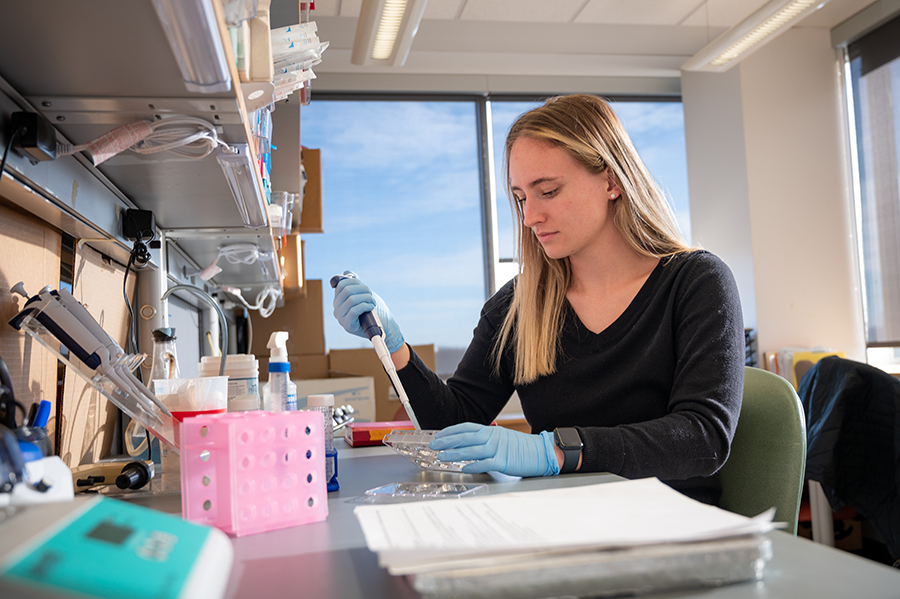
Mia Carrarini Researches Medical Solutions
By Kirsten Heuring
Growing up in Apollo, Pennsylvania, Mia Carrarini watched her father, an optometrist, work with patients. The experience made her interested in pursuing medicine.
"I learned a lot from my dad," said Carrarini, now a senior at Carnegie Mellon University with majors in biological sciences and psychology and a minor in biomedical engineering. "I've seen him interact with patients, and if I can have 1% of his skill and his kindness, I know I'm going to be a really successful physician."
Carrarini came to Carnegie Mellon with medicine in mind. She joined Carnegie Mellon's Health Professions Program (HPP) her first year. Through HPP and its director, Jason D'Antonio, assistant teaching professor of biological sciences, she connected with a research opportunity at the University of Pittsburgh School of Medicine.
In the summer of 2022, Carrarini joined the lab of Donald DeFranco, professor of pharmacology and neuroscience at Pitt. She started on a mostly independent project where she investigated potential pharmacological solutions for premature babies who are likely to be affected by bronchopulmonary dysplasia, a chronic lung disease that damages the tissue.
"During my time volunteering in the Magee-Womens NICU, I've become especially sensitive to issues affecting the vulnerable preterm infant population," Carrarini said. "When I heard about the DeFranco lab's work to help improve their quality of life, I knew I had to get involved."
Current bronchopulmonary dysplasia treatments can include the corticosteroid dexamethasone; though this treatment could help the lungs, it potentially has significant negative side effects, particularly on brain development in premature babies. However, by testing current drugs on human cells, she investigated the efficacy of a potential new option to promote lung maturation in premature infants while limiting negative side effects associated with dexamethasone.
"The drug that we've found is actually an asthma medication that's already approved for use in young children," Carrarini said. "In animal models, we're not seeing negative effects on the brain, but we are seeing the same anti-inflammatory, protective effects in the lungs."
The project's next steps will involve drug trials in humans, where Carrarini and other researchers in the DeFranco lab and their collaborators will investigate whether the drug is as effective as it has been shown to be in pre-clinical models.
DeFranco said that Carrarini was highly dedicated to her research, and he said her work has helped move the lab forward.
"Beyond her technical skills, which are great, she's very dedicated," DeFranco said. "She's inquisitive and willing to recognize what she knows and what she doesn't know."
Carrarini has also assisted with a new project in the same lab, investigating benign prostatic hyperplasia, an age-related condition where the prostate enlarges. Current solutions are unable to effectively manage the discomfort, but based on previous research, Carrarini found some areas of gene expression that may play a role in developing benign prostatic hyperplasia. With further research, she hopes she can help find a treatment using those genetic targets.
Outside of the lab Carrarini is the president of CMU Doctors of Carnegie Society (CMU DOCS), a pre-health student organization. She said that she is happy to lead an organization that has significantly helped her on her journey to becoming a physician.
"I'm very thankful for this opportunity because I get to take the knowledge I have accrued over the past few years and do my very best to share it with other CMU students," Carrarini said. "It's certainly not easy being a pre-health student, which is why I know it is important to keep building a welcoming and supportive community."
Carrarini plans to attend medical school in fall 2024, and Pitt is at the top of her list, which would allow her to continue in the DeFranco lab.
"I would love to have her stay," DeFranco said. "She would be a great addition as a medical student, and she could work on the clinical projects we are currently working on."
D'Antonio agreed that Carrarini would make an excellent physician and a researcher.
"As a student and student leader on our campus, Mia is engaged, outgoing, lively, charismatic, mature and reliable," D'Antonio said. "She is also professional and respectful in how she interacts with people on and off campus. Mia is a strong example of a CMU student who engages with the broader Pittsburgh community in maximizing her college experience as she prepares for a career in medicine."